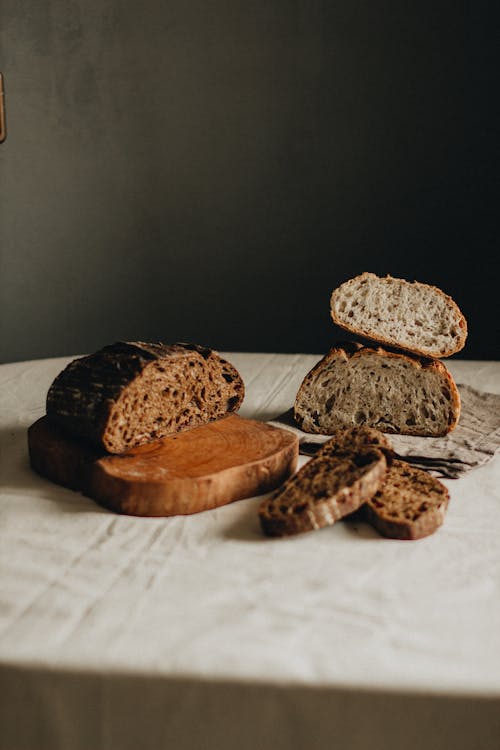Goats are known for their adventurous appetites, happily munching on a variety of plants and sometimes even seemingly non-edible things. But with good intentions comes the responsibility to ensure their diet is safe and nutritious. So, the question arises: can goats eat moldy bread? The answer is a resounding no. While they might take a tentative nibble, moldy bread poses a significant health risk to these curious creatures. This guide will discuss the dangers of moldy bread for goats, explore safer alternatives, and emphasize the importance of a balanced diet for their overall well-being.
Why Moldy Bread is a Recipe for Trouble for Goats
Moldy bread might seem like a harmless treat to toss your goat’s way, but the presence of mold introduces a multitude of potential health problems. Here’s a closer look at the specific dangers:
Mycotoxin Poisoning:
Mold growth is a breeding ground for mycotoxins, a class of toxic substances produced by certain fungi. These toxins can be extremely harmful to both humans and animals, including goats. Mycotoxin poisoning can cause a variety of symptoms, depending on the specific type of mold ingested and the amount consumed. Symptoms can range from mild digestive upset like vomiting and diarrhea to more serious problems affecting the nervous system, liver, and kidneys. In severe cases, mycotoxin poisoning can be fatal.
Digestive Issues:
Even without the presence of mycotoxins, moldy bread can wreak havoc on a goat’s digestive system. Mold itself can be difficult for goats to digest, putting a strain on their gut bacteria. Furthermore, the presence of mycotoxins can further irritate the digestive tract, leading to bloating, diarrhea, and abdominal pain. These digestive issues can be uncomfortable for your goat and can potentially lead to more serious health problems if left untreated.
Respiratory Problems:
Mold spores are microscopic and airborne. When goats come into contact with moldy bread, they might inhale these spores. Inhaled mold spores can irritate the respiratory system, causing coughing, wheezing, and difficulty breathing. This is especially risky for young goats or those with underlying respiratory conditions like pneumonia. Chronic exposure to mold spores can even lead to long-term respiratory problems.
Allergic Reactions:
Some goats might be allergic to mold. Consuming moldy bread can trigger an allergic response, leading to symptoms like skin irritation, swelling, and difficulty breathing. If you notice any of these signs after your goat has consumed moldy bread, seek immediate veterinary attention.
Spoilage Risk:
Mold is just the tip of the iceberg. Moldy bread is a breeding ground for bacteria and other pathogens that can further harm your goat’s health. These pathogens can exacerbate digestive issues and potentially lead to more serious infections. Discarding moldy bread is the safest course of action to prevent the spread of harmful bacteria and mold spores.

Keeping Your Goats Safe: Healthy and Delicious Alternatives
Now that we understand the dangers of moldy bread, let’s explore some delicious and safe alternatives to keep your goats happy and healthy:
- Grasses: A variety of grasses form the foundation of a healthy goat diet. These include orchard grass, brome, and fescue. Grazing allows goats to fulfill their natural browsing instincts while providing them with essential nutrients like fiber, protein, and essential vitamins.
- Weeds: Many common weeds are not only safe but also nutritious for goats. Dandelions, clover, and plantain are all excellent choices. However, it’s crucial to properly identify weeds before offering them to your goats, as some can be toxic. If you’re unsure about a particular weed, consult a local gardening expert or veterinarian for guidance.
- Shrubs: Goat-safe shrubs like willow, hazelnut, and blackberry bushes can be a fantastic source of browse. These shrubs offer variety and mental stimulation for your goats while providing them with additional nutrients. Just ensure the shrubs haven’t been treated with herbicides or pesticides before allowing your goats access to them.
- Fruits and Vegetables: Goats can enjoy occasional treats of fruits and vegetables like apples, pears, carrots, and pumpkins. These offer a burst of sweetness and vitamins, but remember, they should be offered sparingly as treats, not dietary staples. Too much fruit can cause digestive upset, and sugary treats can disrupt the delicate balance of bacteria in their gut.
- Hay: High-quality hay is an essential component of a goat’s diet, particularly during winter months when fresh forage is scarce. Hay provides essential fiber, which aids digestion and keeps your goat feeling full. Choose hay varieties based on your goat’s age and life stage. For growing goats, alfalfa hay is a good choice, while adult goats can thrive on grass hay.
Important Note: Always introduce new foods gradually to avoid digestive upset. Start with a small amount and monitor your goat closely for any signs of discomfort. If you notice any negative reactions, discontinue offering that particular food item.

Building a Balanced Diet for Optimal Goat Health
A balanced diet is the cornerstone of good health for your goats. Just like humans, goats thrive on a variety of nutritious foods that provide them with the essential nutrients they need to stay active, healthy, and happy. Here are the key components of a well-rounded goat diet:
- High-Quality Hay: As mentioned earlier, hay forms the base of a goat’s diet. It provides them with the roughage needed for proper digestion and keeps their rumen functioning optimally. Aim for at least 2-3 pounds of hay per adult goat daily, adjusting the amount based on their age, activity level, and overall health.
- Commercial Feed: A balanced commercial goat feed formulated for their specific age and life stage fills nutritional gaps and ensures they receive essential vitamins and minerals that might be lacking in their regular forage. These feeds are typically formulated to complement hay and provide the necessary protein, energy, and minerals for optimal growth, reproduction, and milk production. Follow the feeding guidelines on the feed bag based on your goat’s weight and activity level to avoid overfeeding or underfeeding.
- Fresh Water: Clean, fresh water is vital for all animals, including goats. Ensure they have constant access to a clean water source. The amount of water they consume will vary depending on factors like weather, diet, and activity level, but they should always have the option to hydrate whenever needed. Regularly check and refill their water trough to ensure it’s clean and free of debris.
- Mineral Lick: A mineral lick provides essential minerals like calcium, magnesium, and sodium that might be lacking in their regular diet. These minerals are crucial for healthy bone development, muscle function, and overall health. Choose a commercially available mineral lick specifically formulated for goats, ensuring it contains the right balance of minerals they need. Place the mineral lick in a convenient location within their enclosure and monitor their consumption.
- Browse: Offering a variety of safe browse options like grasses, weeds, and approved shrubs can enrich your goat’s diet and provide them with mental stimulation. Browsing allows them to express their natural foraging instincts while adding variety to their diet. However, prioritize hay and commercial feed for their core nutritional needs.
- Limited Treats: Occasional treats like fruits and vegetables can be offered in moderation. These provide a delightful change of pace and a burst of vitamins, but remember, they are not a substitute for a balanced diet. Overdoing treats can disrupt their digestive system and lead to health problems.
Consulting a Veterinarian:
For personalized dietary advice specific to your goat’s breed, age, and health condition, consulting with a veterinarian is highly recommended. A veterinarian can assess your goat’s individual needs and create a customized feeding plan that ensures they receive the optimal nutrition for a long and healthy life.
Final Verdict: Say No to Moldy Bread, Embrace a Balanced Diet
While the sight of leftover bread might tempt you to toss it your goat’s way, resist the urge. Moldy bread poses a significant health risk to your caprine companions. The presence of mold and mycotoxins can lead to a variety of health problems, ranging from digestive upset to respiratory issues and even allergic reactions.
There are many safe and delicious alternatives available to keep your goats happy and healthy. Focus on providing a balanced diet rich in high-quality hay, commercial feed, fresh water, and essential minerals. Occasional treats of fruits and vegetables can add variety, but remember, moderation is key. By prioritizing a healthy diet, you’re laying the foundation for a happy and thriving goat herd. After all, a healthy goat is a happy goat!

